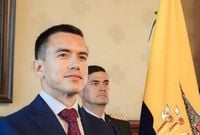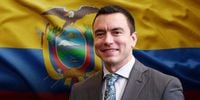Ecuador found itself in the global spotlight this week after President Daniel Noboa’s motorcade came under violent attack in the rural town of El Tambo, an incident that the government is calling a clear assassination attempt. The attack, which took place on Tuesday, October 7, 2025, unfolded as Noboa was traveling to inaugurate new public works projects in one of the country’s most impoverished regions—a journey that would end with his armored SUV battered by stones, bricks, and what officials say were bullets.
According to reporting by Reuters and Teleamazonas, the president’s convoy was ambushed by a crowd of approximately 500 protesters, many of whom were seen draped in flags and scrambling to collect large stones and bricks. Video footage, released by the government and widely shared on social media, showed the tense moments as projectiles cracked the windows of the president’s vehicle. Amid the chaos, a voice could be heard shouting, “Heads down! Heads down!” as the convoy sped away, narrowly escaping the escalating violence.
Environment and Energy Minister Ines Manzano confirmed to reporters that Noboa’s car bore bullet marks, although Ecuadorean law enforcement has yet to independently corroborate the presence of gunfire. “About 500 people appeared and began throwing stones, and there are also bullet marks on the president’s car,” Manzano stated, as reported by Chinese news agencies and Gujarat Samachar. She added that the president was unharmed, but several vehicles in the convoy sustained significant damage.
The attack came at a time of mounting unrest across Ecuador, with Indigenous-led protests entering their third week. The demonstrations were sparked by President Noboa’s controversial decision to end diesel subsidies on September 12, 2025—a move that caused fuel prices to jump from $1.80 to $2.80 per gallon, hitting rural and low-income communities especially hard. The largest Indigenous federation, CONAIE, responded by launching a nationwide strike and organizing protests that have grown in size and intensity with each passing day.
Defense Minister Gian Carlo Loffredo minced no words in his condemnation of the attack, telling Teleamazonas that “the level of aggression with which the convoy was attacked indicates that this was a clear assassination attempt and an act of terrorism against the president.” He went on to warn that protest leaders were “turning up the heat on the street, who are calling for the takeover of cities.”
Authorities moved swiftly in the wake of the attack, arresting five suspects who now face terrorism charges. Interior Minister John Reimberg told local media that a forensic analysis would be conducted on Noboa’s vehicle to determine whether it was indeed fired upon. “We have five people detained, but that doesn’t mean they’re the only ones,” Reimberg said, adding that video footage from the scene would be used to identify additional suspects. “The world was a witness to what happened yesterday. They’re responsible for the chaos and the violent acts.”
But the government’s account of events has not gone unchallenged. The national Indigenous federation CONAIE, which has been at the forefront of the protests, accused law enforcement of carrying out a “brutal police and military action” against demonstrators—including elderly women—before the president’s arrival in El Tambo. CONAIE posted a video on X (formerly Twitter) showing a woman in traditional dress being marched off by police, denouncing the arrests as arbitrary. The group also called on international organizations to monitor the situation closely, alleging that the government’s actions were an attempt to justify a “war policy” against Indigenous communities.
The unrest has already taken a deadly toll. On September 28, a protester was shot and killed during clashes in El Tambo, an incident that CONAIE blamed squarely on security forces. Last week, nearly 100 people were detained, and military personnel were briefly held by demonstrators. The government’s response has been to double down, with President Noboa extending a state of emergency for another 30 days in four coastal provinces and one canton, a measure that suspends certain constitutional protections and enables the deployment of military forces to maintain order.
President Noboa, a banana industry magnate who was re-elected in April 2025 on promises to tackle Ecuador’s spiraling crime rate and implement fiscal reforms, has remained resolute in the face of mounting opposition. He has frequently relied on emergency powers to address both crime and civil unrest. In a statement on X, Noboa declared that there would be no reversal of the fuel subsidy policy, asserting that the $1.1 billion saved would be redirected to social programs. “Anyone who commits violence will be prosecuted by the law and those who act as criminals will be branded as one,” he stated.
Ecuador’s broader context is one of deepening crisis. The country has reported a staggering 40% year-on-year surge in homicides, with over 5,000 people killed in a nation of just 18 million, according to government statistics cited by Reuters. Past attempts by previous administrations to scrap fuel subsidies have met with similar resistance, often resulting in the swift abandonment of such policies amid nationwide upheaval.
International voices have also weighed in. United Nations Secretary-General Antonio Guterres condemned the violence and urged all parties to engage in peaceful dialogue. “The Secretary-General is deeply concerned about the situation amid ongoing protests, and calls for an end to all violence and on all sides to engage in peaceful dialogue to resolve their differences,” said UN spokesperson Stephane Dujarric.
As the legal process unfolds, with the five detained protesters expected to appear at a hearing on Wednesday, October 8, and the government vowing to continue its investigation, the nation remains on edge. Protesters continue to demand the immediate release of those arrested, including 13 accused of terrorism, while the government insists that law and order must prevail for the country to move forward.
The coming days will test Ecuador’s resilience and its leaders’ ability to navigate a path between fiscal responsibility and social justice. With both sides digging in and the world watching, the fate of President Noboa’s reforms—and perhaps his presidency itself—hangs in the balance.



